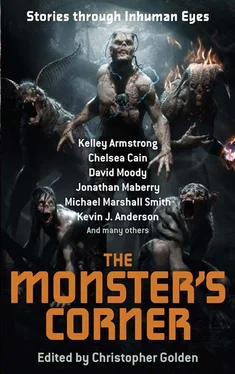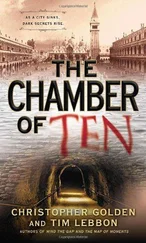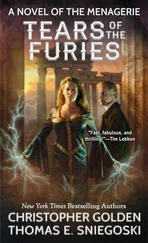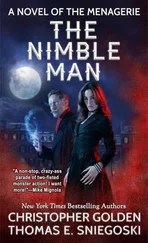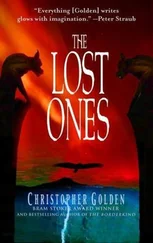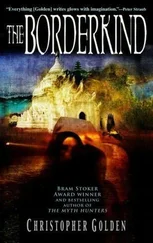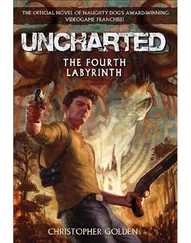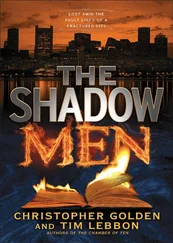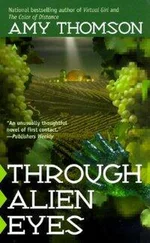The Monster's Corner:
Stories Through Inhuman Eyes edited by Christopher Golden
MONSTROSITY: AN INTRODUCTION
ANYONE WHO HAS EVER READ my work, or even glanced at my Website, will already know that I love monsters. Not in the manner of some passing fancy, the way teenagers express their — OMG — love for those shoes, that dress, this hat. Nor can my love for monsters be compared to your love of ice cream or pizza or pad thai or whatever makes you salivate. It is an enduring love. A love that comes with a deep and abiding connection, an understanding, a knowing.
One of my earliest childhood memories is of sitting on the back porch of my house on Fox Hill Road in Framingham, Massachusetts, with the little black-and-white TV my mother sometimes had on in the kitchen and watching Frankenstein for the first time. I might have been seven. When the monster finds a moment of joy with the little girl by the lake, laughing with her and tossing flower petals into the water until she is the only flower remaining to be plucked and cast …
Wow.
The moment terrified me and broke my heart, all at the same time. The monster didn’t know any better. He didn’t understand the world into which he had been thrust. He had been created with the power to do so much damage, to inflict so much brutality, and yet all he wanted was peace and laughter. When the monster is shown walking into the village with the dead girl in his arms and the villagers react with horror and hatred, the tragedy is complete.
I cried that day. I’m sure I cried in horror and in fear, but I know that my tears also sprang from my sadness for this creature whose monstrosity is no fault of his own.
In the years that followed, I developed a love for all kinds of monsters, thanks in large part to a television landscape that included Creature Double Feature and local programmers who filled their airwaves with Japanese giant monster movies, 1950s atomic nightmares, Hammer horror classics, and others in that vein. But it wasn’t just the movies. My favorite Bugs Bunny cartoons always had monsters in them. When I started reading comic books — or, rather, buying them on my own — I gravitated toward the wonderful horror comics Marvel published in the 1970s.
While there are monsters who are simply that and nothing more, who are truly evil and alien, there are so many more that inspired me to think and feel. The 1976 remake of King Kong, with Jeff Bridges, might not be very good (hey, I was nine, cut me some slack), but when Kong died at the end, it broke my heart. Even as an adult, when I watch the 1933 original, it touches me.
The Tomb of Dracula, the finest of the Marvel horror comics, gave us a Lord of Vampires who was terrifyingly evil, and yet astonishingly human and sympathetic as written by Marv Wolfman and drawn by Gene Colan. His behavior was monstrous, and yet readers could not help but feel for him.
As my literary interests grew, I found myself gravitating toward such portrayals of monstrosity again and again. I read Mary Shelley’s Frankenstein at last, and finally realized something that I had known in my heart for years by that time — the monster was the hero. The monster was the protagonist. Though the story might be structured otherwise, the language and characterization made it an inescapable truth.
This epiphany opened up a whole new way for me to see these stories. Godzilla, of course, was widely misunderstood. Magneto might be the X-Men’s greatest nemesis, and his methods wrong, but he believed in his cause — believed he was doing the right thing for his people.
In college, I wrote more than one paper dissecting my favorite film, Blade Runner, examining the Frankenstein-like moral structure of Ridley Scott’s masterpiece. When it came time to write a term paper on Moby-Dick, there could be no other choice for me than to write an essay titled “In Favor of the Whale.” Though the novel is structured to make Ahab the protagonist, everything about Melville’s language tells us that the opposite is true.
Monsters and monstrosity. Both subjects fascinate me. So much of what we write on those topics is about how we view ourselves, and about the things we fear in ourselves and in others. We want understanding for our own behavior, for the ugliness or otherness we see in ourselves. Like H. P. Lovecraft’s outsider or Billy Joel’s stranger (not Camus’s stranger — that guy’s an asshole), we exist in a world that either does not notice us, or does not notice the us we believe ourselves to be, or which we hope will never notice the us that we fear will not find acceptance in the world. Who are we? What are we? Will others understand?
Back to Blade Runner. Roy Batty tells his creator that he has done terrible things, but “nothing the god of bio-mechanics wouldn’t let you in heaven for.”
Monstrosity is about how we define each other and how we define ourselves. It’s about what we see in the mirror and what we fear others will see. And, at its most basic, it is also about the disturbing truth that we do not know what it is in the minds of others, that the woman next to you in line at the bank or the man dressed as Santa at the mall may view the world and humanity and morality very differently from the way that you do.
Now, let’s talk about reality for a moment. There are monsters, and then there are monsters. There are real killers who go on rampages that leave people dead and others wounded and destroy the lives and the hopes of so many. These are the real monsters, and there are others in our world. My understanding of and sympathy for monsters does not extend to these real-life horrors. It is reserved for the Beast who is misunderstood, whose noble intentions are wrongly perceived by so many, but who, if he is fortunate, finds understanding in the eyes of a Beauty.
Let’s be clear about the line between fiction and reality in my philosophy of monsters. Andrew Vachss, novelist and warrior for the rights of children, once wrote — and I paraphrase — that you can have sympathy for how the monster became the monster without having sympathy for the monster itself. You can sympathize with the child whose experiences forged him into a soulless killer, but once he becomes a monster, sympathy ends.
Got that? Good.
Back to fiction, and my love of fictional monsters.
When I conceived of this anthology, it was with the same love of monstrosity that I described above. I knew that many other writers shared my love for such stories. Once again, as in The New Dead, I cast the net wide, luring in contributors from all genres, knowing that such variety would produce a wealth of different approaches to the subject matter. I talked about Frankenstein and Moby-Dick, and they got it, every last one of them. They understood that, even in the case of a monster who wants to eat us or stomp us or deceive us, sympathy is all in your point of view. Professor X wants mutants to live in peace with humans. Magneto thinks that humans are likely to exterminate mutants if mutants don’t get rid of humans first. You could make an argument that neither of them is wrong.
Stephen King once wrote — and again I’m paraphrasing — that the way we identify monsters is by collective agreement. “I’m okay, you’re okay, but eww, look at that.” I’m fairly certain the thing we’re pointing to, the thing that makes us scowl in disgust, is pointing back with the same look of revulsion. It’s all a matter of perspective. Eew, look at that. Eew, look at us.
Which brings us right back to the outsider, and the mirror. What we hide. What we fear in others and ourselves. Monstrosity.
Читать дальше
